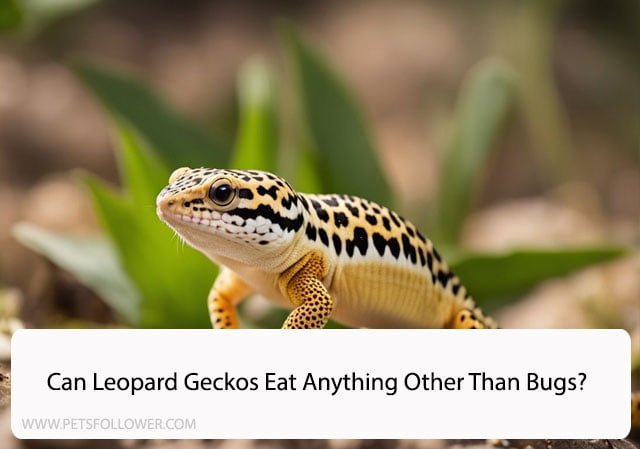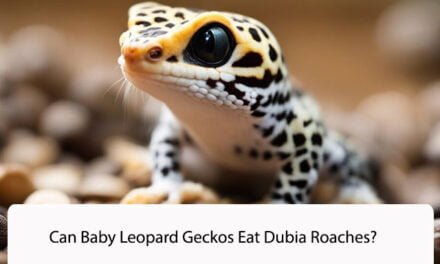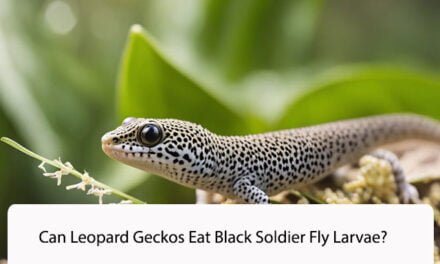Leopard geckos are fascinating creatures that make great pets. However, as with any pet, it’s important to know what they can and cannot eat in order to keep them healthy and happy. One common question that many leopard gecko owners have is whether or not their gecko can eat anything other than bugs.
The short answer is no, leopard geckos should not eat anything other than insects. While it may be tempting to give your gecko a little piece of fruit or vegetable, their digestive system is not equipped to handle anything other than insects. In fact, feeding your gecko anything other than insects can cause serious health problems, including impaction, which is a blockage in their digestive tract.
That being said, there are a variety of insects that leopard geckos can eat, including crickets, mealworms, and dubia roaches. It’s important to provide your gecko with a varied diet to ensure that they are getting all of the nutrients they need to thrive. In the following article, we will take a closer look at why leopard geckos should only eat insects, as well as some of the best insects to feed them.
Dietary Requirements of Leopard Geckos
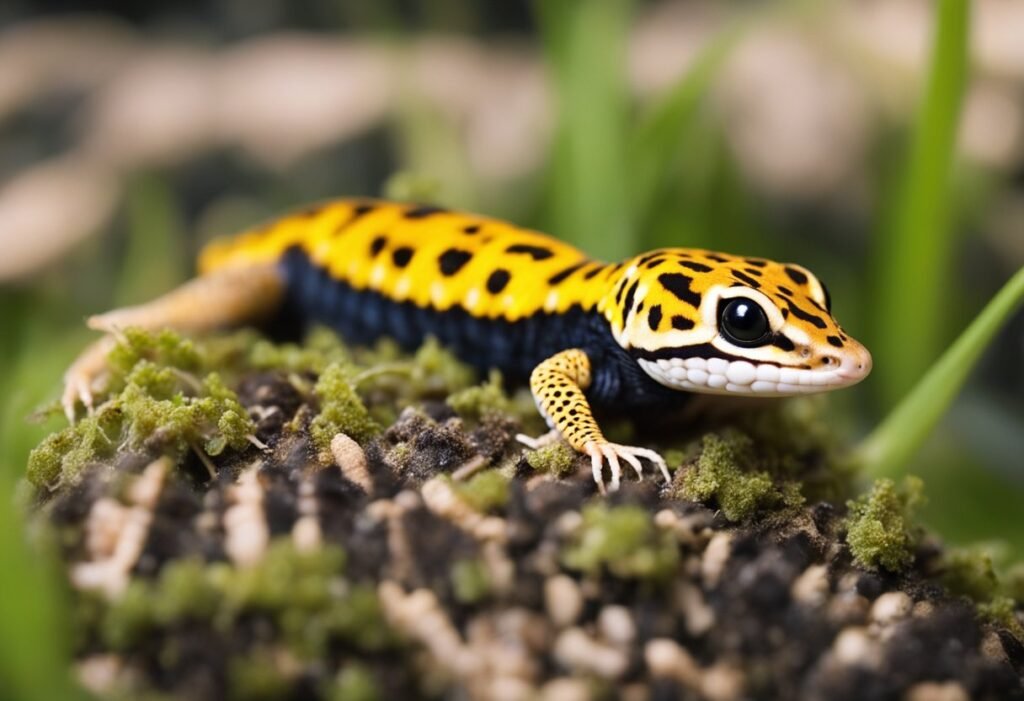
As owners, we want to ensure our leopard geckos are getting the proper nutrition they need to stay healthy and happy. While leopard geckos are primarily insectivores, they do require a balanced diet to meet their nutritional needs.
Leopard geckos require a diet high in protein, low in fat, and rich in vitamins and minerals. In captivity, the most common food source for leopard geckos is crickets, mealworms, and dubia roaches. These insects should be gut-loaded with a nutritious diet before feeding to the gecko.
It’s important to note that leopard geckos cannot digest plant matter efficiently, and it should not make up a significant portion of their diet. Feeding leopard geckos fruits and vegetables can cause digestive issues, leading to health problems.
Supplements are also essential to ensure leopard geckos are getting all the necessary nutrients. Calcium and vitamin D3 are crucial for maintaining healthy bones and preventing metabolic bone disease. Multivitamin supplements can also be added to their diet to ensure they are getting all the necessary vitamins and minerals.
In summary, while leopard geckos primarily eat insects, it’s important to provide a balanced diet that meets their nutritional needs. Gut-loading their food, providing supplements, and avoiding plant matter can help ensure their health and longevity.
Safe Insects and Bugs for Leopard Geckos
Leopard geckos are insectivores, which means that they mainly eat insects and bugs. While it is important to provide a varied diet for your leopard gecko, not all insects and bugs are safe for them to eat. In this section, we will discuss the safe insects and bugs that you can feed your leopard gecko.
Crickets and Mealworms
Crickets and mealworms are the most common insects that leopard geckos eat. They are both safe and nutritious for your leopard gecko. Crickets are a good source of protein and fiber, while mealworms are high in fat and protein. However, it is important to gut-load the crickets and mealworms before feeding them to your leopard gecko. This means feeding the insects a nutritious diet before feeding them to your gecko, so that your gecko can get the most out of the insects.
Dubia Roaches
Dubia roaches are another safe and nutritious insect that you can feed your leopard gecko. They are high in protein and low in fat, making them a great addition to your gecko’s diet. Dubia roaches are also easy to digest, which is important for your gecko’s health. However, it is important to make sure that the roaches are the appropriate size for your gecko, as larger roaches can be difficult for your gecko to digest.
Waxworms and Superworms
Waxworms and superworms are high in fat and protein, making them a great treat for your leopard gecko. However, they should only be fed in moderation, as they can be high in calories. Waxworms and superworms should also be fed as part of a balanced diet, and not as a substitute for other insects.
In conclusion, there are several safe insects and bugs that you can feed your leopard gecko. Crickets, mealworms, dubia roaches, waxworms, and superworms are all safe and nutritious options for your gecko. However, it is important to make sure that you gut-load the insects and feed them in moderation, as part of a balanced diet.
Risks of Feeding Non-Insect Foods
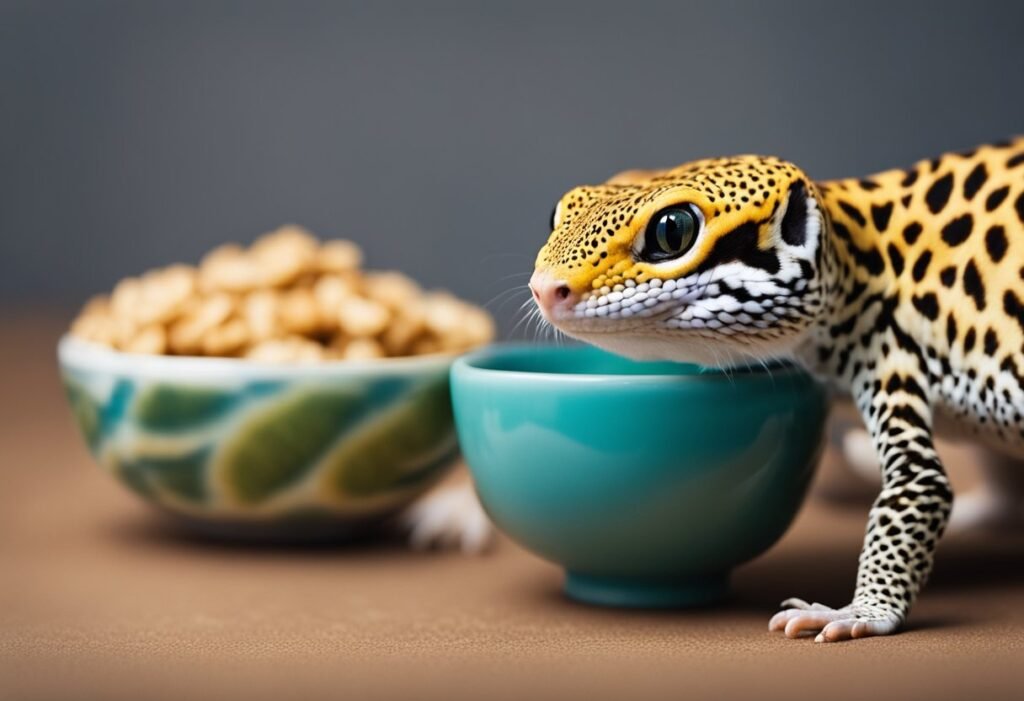
As leopard geckos are obligate insectivores, feeding them anything other than insects may pose several risks. While some owners may be tempted to offer their geckos fruits or vegetables, it is important to note that these foods do not provide the necessary nutrients for their survival.
One of the main risks of feeding non-insect foods to leopard geckos is the potential for nutrient deficiencies. Unlike mammals, reptiles cannot produce their own vitamin C and require it in their diet. Fruits and vegetables that are high in vitamin C may seem like a good choice, but they also contain high levels of sugar, which can lead to obesity and other health problems.
Another risk is the potential for impaction. Leopard geckos have a small digestive system and are not able to digest large amounts of fiber or plant matter. Feeding them fruits or vegetables can lead to blockages in their digestive tract, which can be fatal if not treated promptly.
In addition, feeding non-insect foods can also lead to dental problems. Leopard geckos have small teeth that are designed for tearing and crushing insect exoskeletons. Feeding them foods that are too hard or tough can cause their teeth to wear down or break, leading to pain and difficulty eating.
Overall, while it may be tempting to offer leopard geckos a variety of foods, it is important to stick to their natural diet of insects. This will ensure that they receive the necessary nutrients and avoid any potential health risks.
Alternative Food Options
When it comes to feeding leopard geckos, insects are the primary food source. However, there are a few alternative food options that can be added to their diet to provide variety and nutritional benefits.
Commercial Diets
Commercial diets, also known as prepared diets, are becoming more popular among leopard gecko owners. These diets are formulated to provide a balanced mix of nutrients and can be found in both powdered and pellet form. They typically contain a blend of proteins, vitamins, and minerals that are essential for a healthy diet.
It is important to note that not all commercial diets are created equal. Some may contain fillers or unnecessary ingredients that can be harmful to your gecko. It is essential to research and choose a high-quality diet that meets your gecko’s nutritional requirements.
Supplements and Vitamins
Supplements and vitamins can be added to your gecko’s diet to provide additional nutrients. Calcium and vitamin D3 are particularly important for leopard geckos. Calcium is necessary for bone health, while vitamin D3 aids in calcium absorption.
Supplements and vitamins can be added to your gecko’s food or water. However, it is essential to follow the manufacturer’s instructions carefully to avoid over-supplementing, which can be harmful to your gecko.
In conclusion, while insects should remain the primary food source for leopard geckos, adding alternative food options such as commercial diets and supplements can provide variety and nutritional benefits. It is essential to research and choose high-quality products and follow instructions carefully to ensure your gecko’s health and well-being.
Feeding Schedule and Portion Control
When it comes to feeding leopard geckos, it is important to establish a feeding schedule and control the portions they consume. We recommend feeding adult leopard geckos every other day, while juveniles should be fed daily.
It is important to note that leopard geckos can easily become overweight, which can lead to health issues such as fatty liver disease. Therefore, it is crucial to control the portions they consume. A good rule of thumb is to offer them an amount of food that is roughly the size of their head.
In terms of the type of food, it is best to stick to insects as the main source of nutrition for leopard geckos. However, they can also be fed small amounts of fruits and vegetables as occasional treats. It is important to avoid feeding them toxic foods such as avocado, rhubarb, and chocolate.
To ensure that your leopard gecko is getting all the necessary nutrients, we recommend dusting their food with a calcium and vitamin D3 supplement. This will help prevent metabolic bone disease, which is common in reptiles that do not receive enough calcium in their diet.
Overall, establishing a feeding schedule and controlling the portions your leopard gecko consumes is crucial for their health and well-being. By following these guidelines and offering a balanced diet, you can ensure that your leopard gecko is happy and healthy.
Water and Hydration Needs
Leopard geckos require access to clean water at all times to maintain proper hydration. It is important to provide a shallow water dish that is large enough for the gecko to soak in if desired. We recommend using a dish that is easy to clean and disinfect.
It is also important to ensure that the water is changed daily to prevent the growth of harmful bacteria. In addition to providing a water dish, we recommend misting the enclosure with water once a day to help maintain proper humidity levels.
Leopard geckos can obtain some of their hydration needs from the food they eat, but it is still important to provide access to clean water. It is not recommended to feed leopard geckos foods that are high in water content, such as fruits and vegetables, as their digestive systems are not designed to process them efficiently.
Overall, providing access to clean water and maintaining proper humidity levels are essential for keeping leopard geckos healthy and hydrated.
Signs of Nutritional Deficiencies
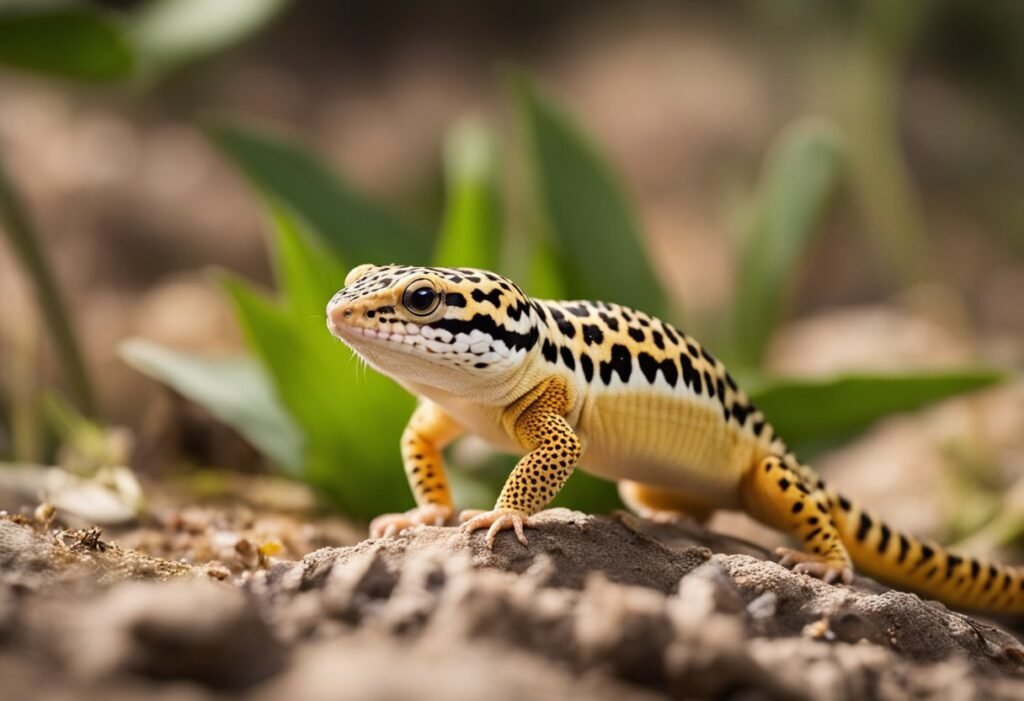
As with any animal, it is important to ensure that leopard geckos are receiving a balanced diet to maintain their health. A lack of proper nutrition can lead to various health issues, including metabolic bone disease, stunted growth, and even death.
Here are some signs of nutritional deficiencies to look out for in leopard geckos:
Calcium Deficiency
Leopard geckos require calcium for proper bone growth and muscle function. Without enough calcium, they may develop metabolic bone disease, which can cause deformities, fractures, and even paralysis.
Signs of calcium deficiency include:
- Soft or rubbery bones
- Difficulty walking or climbing
- Tremors or seizures
- Loss of appetite
To prevent calcium deficiency, it is important to provide leopard geckos with a calcium supplement, such as calcium powder, and dust their food with it before feeding.
Vitamin A Deficiency
Vitamin A is essential for proper eye function, skin health, and immune system function. Without enough vitamin A, leopard geckos may develop skin and eye infections, as well as a weakened immune system.
Signs of vitamin A deficiency include:
- Swollen eyelids
- Cloudy eyes
- Skin infections
- Loss of appetite
To prevent vitamin A deficiency, it is important to provide leopard geckos with a balanced diet that includes foods high in vitamin A, such as carrots, sweet potatoes, and leafy greens.
Protein Deficiency
Leopard geckos require protein for muscle growth and repair. Without enough protein, they may experience stunted growth, weakened muscles, and a weakened immune system.
Signs of protein deficiency include:
- Slow growth
- Weak muscles
- Difficulty shedding
- Poor appetite
To prevent protein deficiency, it is important to provide leopard geckos with a varied diet that includes insects high in protein, such as crickets, mealworms, and waxworms.
By keeping an eye out for these signs of nutritional deficiencies, we can ensure that our leopard geckos are receiving the proper nutrition they need to thrive.
Health Concerns with Improper Diet
Leopard geckos are insectivores, meaning their diet consists primarily of insects. While they may occasionally eat other small animals in the wild, such as spiders or scorpions, it is not recommended to feed them anything other than insects in captivity.
Feeding leopard geckos a diet that is not properly balanced can lead to health problems. For example, feeding them too much fat or too many insects with hard exoskeletons can cause impaction, which is a blockage in their digestive system. This can be life-threatening if not addressed promptly.
Additionally, feeding leopard geckos foods that are too large or difficult for them to digest can cause regurgitation or choking. This can also lead to serious health issues if not addressed quickly.
It is important to ensure that the insects fed to leopard geckos are gut-loaded, meaning they are fed a nutritious diet before being fed to the gecko. This ensures that the gecko is receiving proper nutrition and helps prevent deficiencies.
In summary, feeding leopard geckos anything other than insects can lead to serious health problems. It is important to provide a balanced diet and avoid feeding them anything that may cause impaction or choking. Proper nutrition is key to keeping your leopard gecko healthy and happy.
Frequently Asked Questions
What alternative food options are safe for leopard geckos besides insects?
Leopard geckos are primarily insectivores, meaning their diet consists mainly of insects. However, they can also consume certain types of worms such as mealworms, waxworms, and superworms. It is important to note that worms should not be their primary food source as they lack certain nutrients that are essential for their health.
Can leopard geckos consume any vegetables, and if so, which ones?
Leopard geckos are not known to consume vegetables in the wild, and their digestive system is not designed to process plant matter efficiently. Therefore, it is not recommended to offer vegetables to leopard geckos as a part of their regular diet.
Is it possible for leopard geckos to eat fruits, and what types are recommended?
Leopard geckos can consume certain types of fruits in small amounts, but they should not be a regular part of their diet. Fruits such as papaya, mango, and figs can be offered as an occasional treat.
Are there any specific human foods that are safe for leopard geckos to eat?
Leopard geckos should not be offered human foods as they are not a part of their natural diet. Some human foods may contain ingredients that are harmful to leopard geckos and can cause health issues.
What are the dangers of feeding leopard geckos foods that are not part of their natural diet?
Feeding leopard geckos foods that are not a part of their natural diet can lead to various health issues such as digestive problems, nutrient deficiencies, and obesity. It is important to provide a balanced and varied diet that meets their nutritional requirements.
Do leopard geckos require live prey, or can they eat pre-killed or non-live food sources?
Leopard geckos require live prey as they are natural hunters and enjoy chasing and catching their food. However, pre-killed prey or non-live food sources can be offered in certain situations such as when the gecko is sick or injured and unable to hunt. It is important to ensure that the prey is not too large and is appropriate for the gecko’s size.

